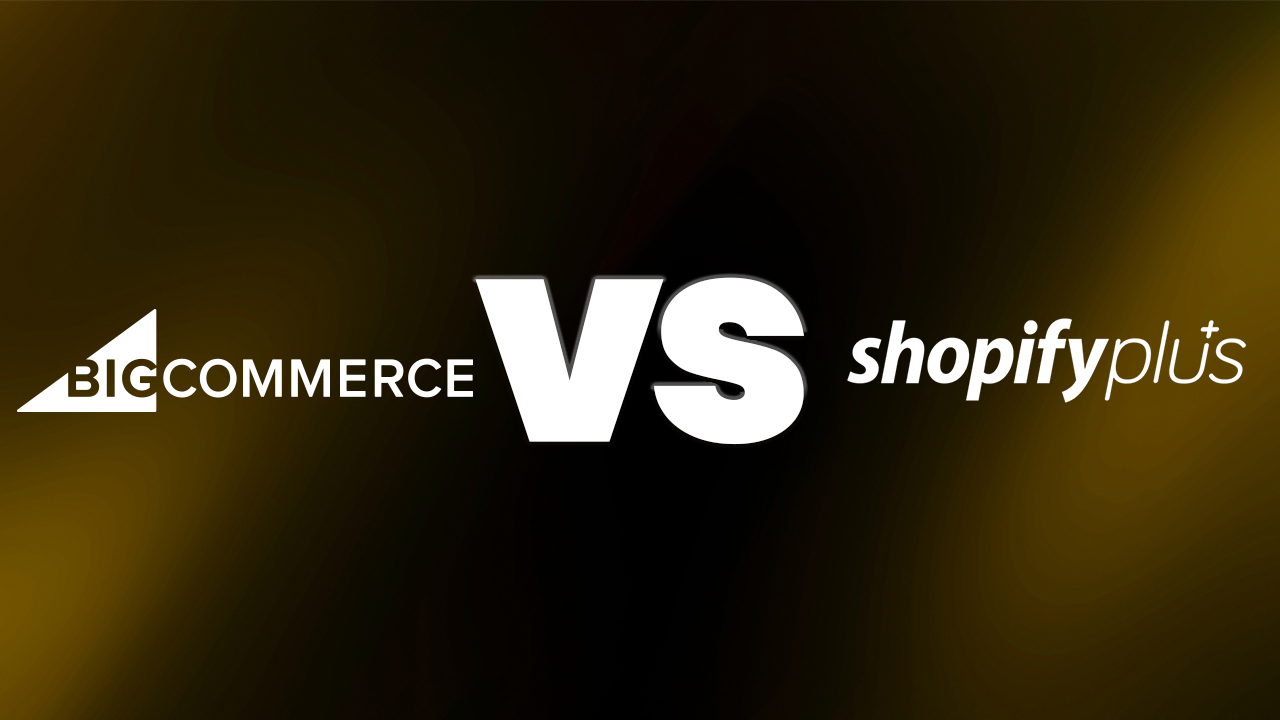EXPLORE
Home
About us
Case Studies
Thoughts
Contact
SOCIAL

Choosing an enterprise eCommerce platform isn’t just about managing your online store—it’s about setting your business up for sustained, scalable success. When your business outgrows standard eCommerce plans, platforms like Shopify Plus and BigCommerce Enterprise become obvious contenders. But despite similar enterprise branding, these two powerful platforms differ substantially in strengths, weaknesses, and ideal use cases.
Having built and managed sites on both platforms extensively, we understand the nuances that separate Shopify Plus and BigCommerce Enterprise. Let’s dive into a thorough breakdown, using clear examples and real-world use cases to help you decide the best fit for your enterprise needs.
• Shopify Plus powers over 17,000 enterprise brands, including Allbirds, Heinz, Gymshark, and Kylie Cosmetics. It’s built for fast-growth D2C and omnichannel retailers, offering ease of use, rapid deployment, and powerful app integrations.
• BigCommerce Enterprise serves roughly 10,000 mid-market and enterprise-level merchants, including Skullcandy, Ben & Jerry’s, and Toyota. Its core strength lies in flexible APIs, native B2B functionality, multi-storefront capability, and superior customization.
Let’s explore key differentiators in more detail:
Shopify Plus offers a famously intuitive interface. Even large teams can quickly onboard and start managing products, inventory, and marketing tools. The simplicity is ideal if you have limited in-house technical resources and value speed-to-market.
BigCommerce Enterprise remains user-friendly but places more emphasis on granular control, custom API integration, and technical flexibility. While easy enough for day-to-day use, it’s particularly appealing if your business employs an internal development team or agency for custom integrations.
Winner: Shopify Plus for simplicity; BigCommerce for flexibility.
If your business runs multiple stores, brands, or markets, platform capability matters.
Shopify Plus recently enhanced its multi-store capabilities, enabling seamless management of multiple storefronts under one centralized admin. However, managing multiple storefronts still involves separate apps and more manual setups.
BigCommerce Enterprise shines here. Its built-in multi-storefront functionality natively manages several stores or brands from a single backend, making it ideal for global brands with multiple currencies, languages, or regional product catalogs.
Winner: BigCommerce Enterprise (clear advantage in multi-store setups).
The global B2B market reached $21 trillion in 2025, and robust B2B capabilities are now essential.
BigCommerce Enterprise offers powerful, native B2B features: customer-specific pricing, quoting, bulk pricing tiers, invoice portals, purchase orders, and custom checkout experiences. It’s naturally suited to manufacturers, distributors, and large-scale wholesalers.
Shopify Plus has steadily improved its B2B features (native wholesale channel, B2B customer groups), but it remains reliant on third-party apps for advanced B2B scenarios. While capable, it still lags slightly behind BigCommerce in complex wholesale and B2B setups.
Winner: BigCommerce Enterprise (B2B powerhouse).
Both platforms handle massive traffic spikes effectively, powering global brands’ Black Friday sales without hiccups.
Shopify Plus employs its own cloud-based infrastructure (Shopify Global Infrastructure), offering near-limitless scalability, industry-leading uptime (99.99%), and rapid performance. Merchants rarely experience downtime.
BigCommerce Enterprise also guarantees 99.99% uptime through Google Cloud Platform infrastructure. It handles massive product catalogs efficiently and excels at serving large-volume, high-SKU-count merchants.
Winner: Tie (both are extremely reliable and scalable).
In the era of headless commerce, flexibility matters.
Shopify Plus offers headless commerce via Storefront API and Hydrogen framework, encouraging fast, customized storefront experiences. But limitations in backend customization remain for heavily specialized integrations.
BigCommerce Enterprise prioritizes headless and API-first architecture natively. Its open SaaS philosophy allows developers far greater control and flexibility for deep backend integration and front-end customization. It’s especially suited to complex enterprise needs.
Winner: BigCommerce Enterprise (extensive headless/API flexibility).
Shopify Plus offers robust built-in SEO tools, structured data support, and excellent integrations with marketing platforms (Klaviyo, HubSpot, Google Ads, Meta). Its simplicity makes advanced SEO optimization straightforward for non-technical users.
BigCommerce Enterprise matches Shopify Plus’s SEO strengths and surpasses it slightly through greater flexibility around URL structures, site architecture customization, and native support for AMP pages.
Winner: Slight advantage to BigCommerce Enterprise for advanced SEO flexibility.
Shopify Plus: Typically priced as a percentage of sales (starting at $2,000/month). It’s predictable and straightforward for budgeting, with minimal hidden fees. However, costs scale with growth.
BigCommerce Enterprise: Uses a flexible tiered pricing model based on your sales volume, usually starting around $1,500/month. Costs scale more predictably, ideal for higher-volume, lower-margin enterprise businesses.
Winner: Tie (depends on your business’s growth trajectory and margins).
Choosing between Shopify Plus and BigCommerce Enterprise depends primarily on your business’s specific needs:
• Shopify Plus is ideal for fast-growing consumer brands needing intuitive management, robust apps, and simplicity at scale.
• BigCommerce Enterprise excels for brands prioritizing B2B, multi-storefront management, extensive customizations, and API flexibility.w
Both platforms are exceptional—but choosing wisely now will position your enterprise for sustained growth.
Their communication and project management. We have found great value in the way they prioritize and dig into the work in a strategic way, all while keeping us informed on what's going on and what's to come. They are incredibly organized and thorough!
Their initial website creative inspired us and brought us down a new path as a brand and led us to take on a new strategy. These guys are constantly looking to improve our site and help us in any way possible
I had the pleasure of working with the Electric Enjin team for over three years and can confidently say that they are a top-notch digital agency.